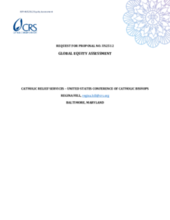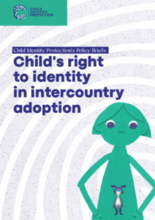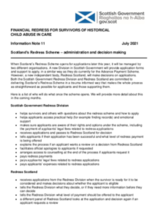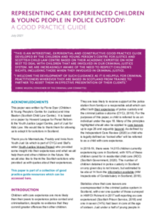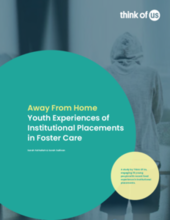Demographic Data
|
Sources: World Bank, UNDP, UNAIDS, DHS 2013 |
Displaying 2421 - 2430 of 14391
"Cowessess First Nation in Saskatchewan is the first Indigenous group in Canada to ink an agreement with Ottawa for federal funding of locally controlled child welfare services since the Act Respecting First Nations, Inuit and Métis Children, Youth and Families came into force last year," says this article from CBC News.
CRS is recruiting for a third-party vendor to conduct a global equity assessment focused on Workforce and Workplace equity, and equity analysis of CRS policies, processes, and practices related to the human resource cycle.
This policy brief draws attention to Article 8 of the UN Convention on the Rights of the Child (CRC) which notes that a child has a right to identity including a name, a nationality and family relations. Whenever a child is deprived of one of these elements, States have an obligation to restore the child’s identity speedily. At the heart of any intercountry adoption (ICA) is the modification of a child’s identity given at birth. The brief also includes recommendations for policymakers.
The Kenya-Italy “Virtual Exchange Program on Foster Care” aims to create a platform for learning, networking and sharing knowledge and best practices on Foster Care among different government stakeholders, from Kenya and Italy.
The exchange program took place on 5th, 7th and 9th July 2021.
The Miracle Foundation Youth for Social Impact Program is an initiative that seeks to empower youth with lived experience of family separation to work with their local communities to address pressing challenges in the areas of transitioning from institution to family care and family/community strengthening. Miracle Foundation is inviting young people with experience of family separation to join this program.
Changing the Way We Care (CTWWC) conducted a study on the support by U.S. Catholic organizations for overseas residential care of children in 2018. This report provides insights from the study on U.S. Catholic Church support for children’s residential care facilities outside of the U.S. Its data provides a foundation for building effective engagement and messaging strategies, as well as helps inform advocacy and influence work concerning support for family strengthening and care for vulnerable children by the U.S. Catholic community.
Update on administration and decision making work taking place since the The Redress for Survivors (Historical Child Abuse in Care) (Scotland) Bill was passed by Parliament in March 2021.
The Children and Young People’s Centre for Justice (CYCJ), in collaboration with the Scottish Child Law Centre, has produced a resource to support Scottish solicitors and practitioners with Good Practice Principles when representing care experienced children in police custody, to ensure their rights are upheld.
In June 2020 CELCIS produced the first Lifelong Links Briefing, outlining the ongoing evaluation of Lifelong Links in Scotland. In it, we presented some of the initial topics that were emerging from the data we had received or collected. The aim was to help local sites and Family Rights Group to continue to develop their practice and improve the lives of children and young people in Scotland.
This study provides a deep, nuanced understanding of the lived experience and mental models of young people who have recently lived in institutional placements while in foster care. It offers an understanding of institutional placements from youths’ perspectives.

